Political Disruption - July 2019
Economic statecraft 2.0, US-China conflict, Erdogan's miscalculation, Iran and some more trade news.
Thursday, July 4, 2019
Political Disruption brings you insights on how the fast-changing global political environment is creating political disruption of business.
Good morning, this month we talk about how economic statecraft is reaching a new level with cyber attacks intensifying and political detention becoming a new technique. We discuss the US-China meeting in Osaka at the G20. Then we focus on the implications of the AKP’s loss in the Istanbul elections rerun. Then we go to Iran (again) for an update on its conflict with the US and finally we find some good and bad trade news.
Welcome to Political Disruption in July!
Hans Diels
1. Economic statecraft 2.0 - Hacking and political detention
Business risk: Increased risk of political detention and damage occurring due to hacking of infrastructure.

Source: torange.biz
Economic statecraft on the rise. In a world of geopolitical competition and high levels of economic interdependence economic statecraft will thrive. This is what we’ve seen in the American politicization of trade policymaking and in the Chinese instrumentalization of regulatory measures to punish firms of governments with which it has political disagreements (remember when the Chinese stopped buying Norwegian salmon when the Chinese dissident Wen Xiabo received the Noble Peace Price?). Moreover, the use of economic statecraft has been spreading to other states (Qatar blockade and Saudi Arabia stopping to send patients to Canadian hospitals).
Detention wars. However this was just the beginning. Economic statecraft or the use of economic interdependencies to reach political goals, is reaching new heights these months. The first escalation was the use of detention as a political weapon in the trade conflict. First, there was the arrest of Meng Whanzhou, CFO and daughter of Huawei Founder Ren Zhengfei. She was arrested in Canada at the request of the United States for breaching US regulations banning dealings with Iran. While the extraterritorial application of US law (another form of economic statecraft using the pervasiveness of the US financial system, is nothing new, Trump’s politicisation of the arrest is new. The US President suggested that Meng Wanzou’s release could be part of a trade deal with China. By taking her arrest out of the legal and into the political sphere, all pretence of a purely legal process has been dropped. In reaction to Meng’s arrest, China arrested Michael Kovrig, a former Canadian diplomat, now working for the International Crisis Group. In this way, detention is becoming a political weapon and should concern businesspeople and other people travelling to China in these tense times.
Hacking Wars. Another example of the ramping up of the level of economic statecraft is the cyberconflict that is further developing between the US and Russia. A New York Times (NYT) report shows that US forces have stepped up operations in Russia. The US has placed implants on the Russian electricity grid. The fact that the US didn’t mind the NYT bringing out the news shows that the operations are meant to deter Russia of attacking the American grid.
2. (another) Truce? An agreement? Or continued US-China conflict?
Business risk: While a temporary cease-fire in the US-China trade conflict might comfort some market players, the truce will only be temporary, and we can expect further disruptions (tariffs, sanctions and informal measures) soon between the US and China.
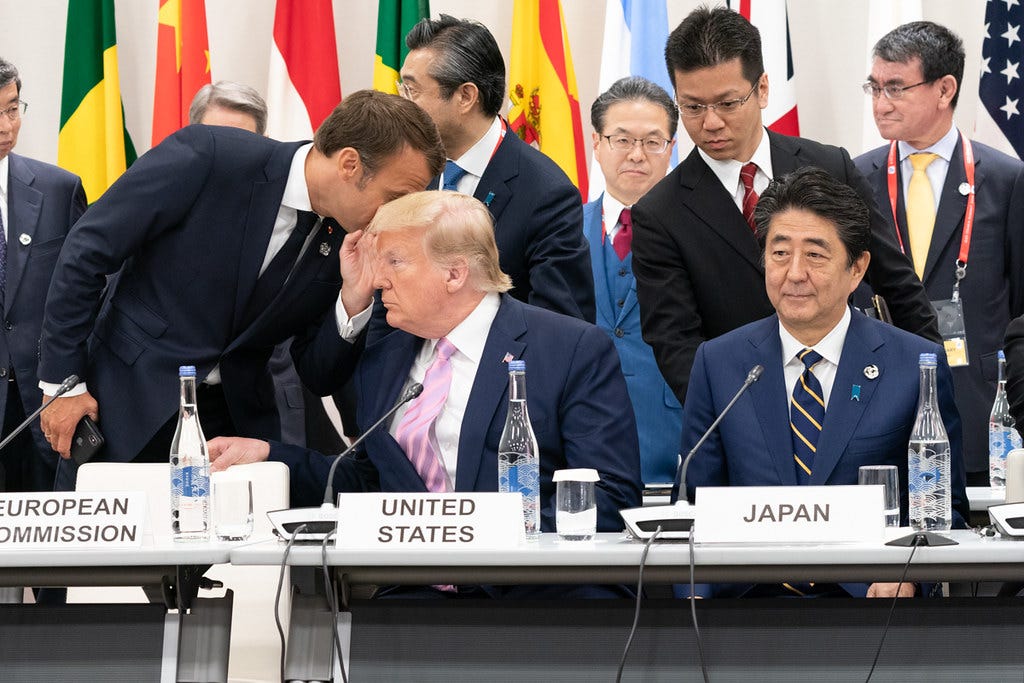
President Trump during the G20 meeting in Osaka, Japan (Source: White House)
Is it a truce, is it an agreement? It’s certainly not an agreement at this moment. However, at his G20 meeting with Chinese President Xi Jinping, President Trump made some gestures to China. He said that he would allow US companies to sell to Huawei again and put off any new tariffs on China. China also promised to start repurchasing US agriculture products.
Huawei is back! Strangely, the President let Huawei off the hook after months of pressuring US allies to stop dealing with the firm as it presents a national security risk. The latter is something a lot of US Senators also believe and China-hawk, Marco Rubio, already threatened with Congressional action if the President would weaken his stance on Huawei.
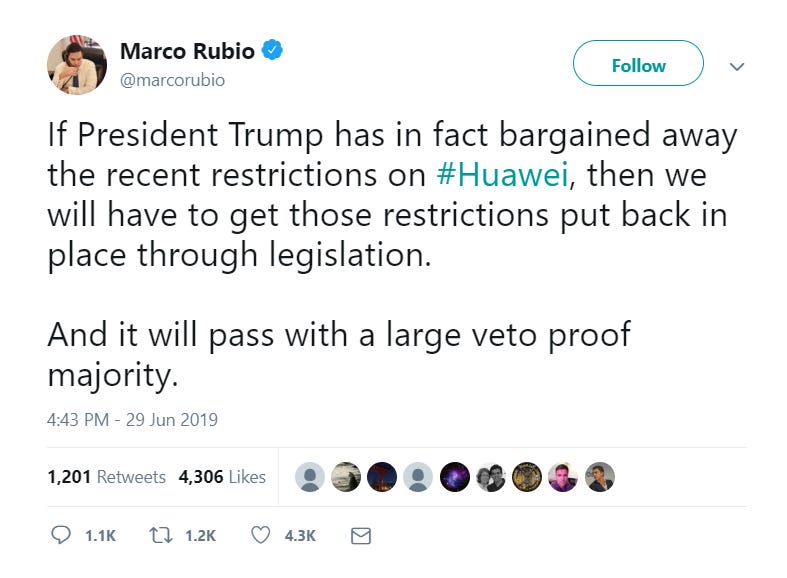
Trade or national security? The confusion around whether Huawei is just a chip in the trade negotiations or an imminent security threat illustrates the fact that Trump’s actions on China are a combination of tactical measures pushed by different groups in his administration. It makes clear that there’s a lack of a real China-strategy that determines whether China is a strategic geopolitical competitor or just a badly behaving trade partner.
Continued conflict? Given that one of the few issues on which there’s an agreement in the US Congress is China’s emergence as a real strategic competitor, we can expect the conflict to continue and no temporary cease-fire or some insignificant deal will solve the structurally conflicting relationship between the US and China. Expect more turbulence in the future.
3. Erdogan’s big miscalculation
Business risk: Big risk of increased political instability, which will make the already hard economic situation even harder. Smaller risk of temporary disruptions of maritime traffic through the Turkish Straits.
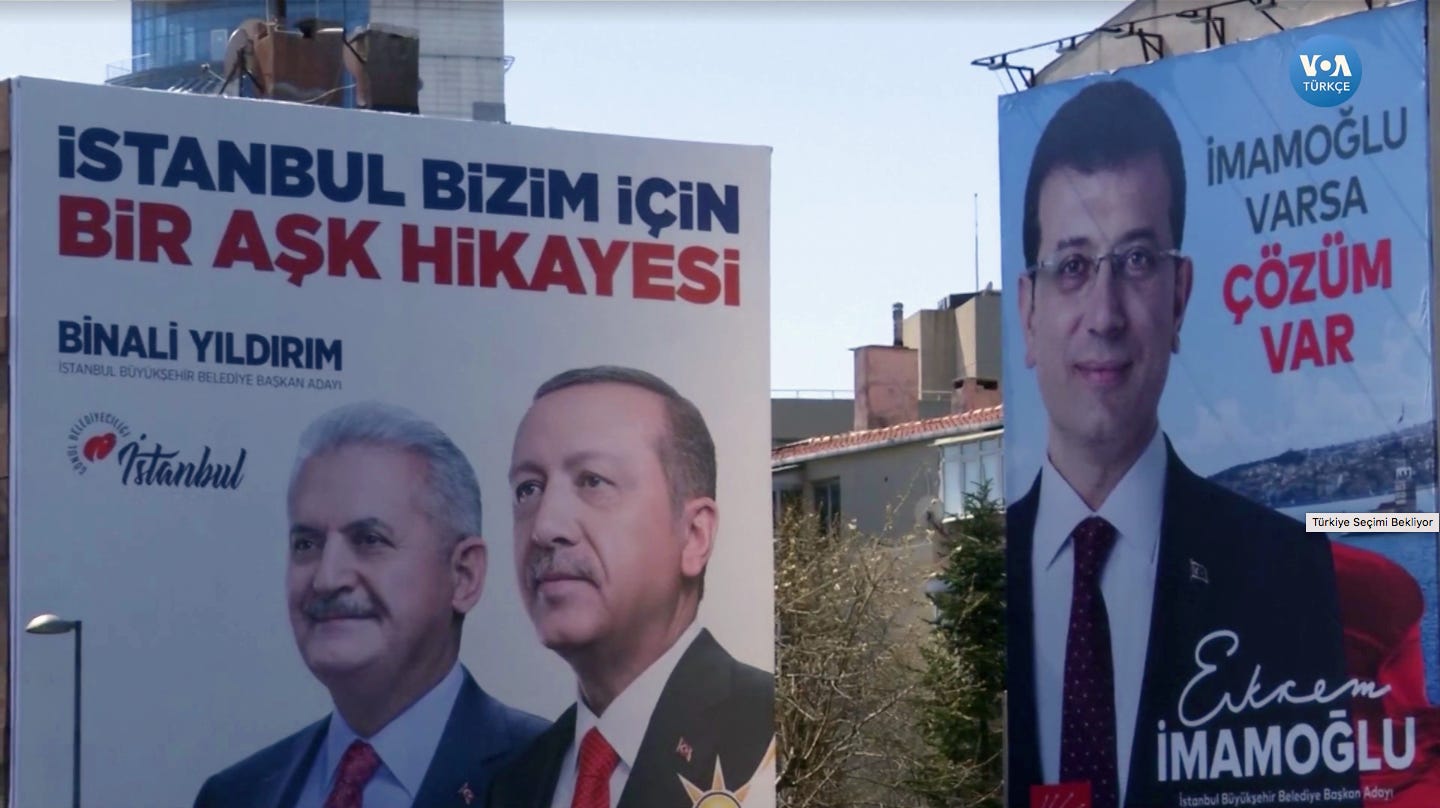
What happened before? On March 31, Erdogan’s AKP party lost municipal elections in Istanbul by 0.2%. President Erdogan refused to accept his loss and forced a rerun of the elections. Erdogan reached himself national prominence when he was elected mayor of Istanbul in 1994.
What happened now? On Sunday, June 23, the rerun led to an even bigger defeat for the AKP candidate. He lost from Ekrem Imamoglu of the centre-left CHP with 9.2% of the votes. In addition to the symbolism, losing Istanbul is also a big blow to the AKP’s patronage networks for which Istanbul is essential.
What will happen? Turkish opposition parties will feel bolstered after their victory in Istanbul (and other important cities). This will strengthen their determination to keep resisting the slide towards repression. At the same time, Erdogan weakened and humiliated will probably not give the opposition more leeway. He will dig in! These two dynamics will collide, and we expect a lot more political instability in Turkey due to increasing conflict between Erdogan and his opponents.
Not repressive enough, not free enough. Turkey is a typical case of a political regime in between democracy and autocracy. On one hand, it's not oppressive enough to contain all political dissident and on the other hand it’s not free enough to create political openings to voice legitimate concerns without breaking the law. This makes it a very combustible environment without a pressure valve, leading to a potential blow-up.
Why does it matter? Turkey is the EU’s fifth largest trade partner and instability and economic crisis will have an impact on the EU’s economy. Besides, Turkey is already in quite some trouble in its relationship with the US as it plans to buy a Russian anti-missile system. The US has threatened with sanctions if the sale proceeds. Finally, Turkey has a deal on migration with the EU, where it receives millions of refugees in exchange for European money. If instability increases, the refugee deal could be threatened, potentially creating a new migration crisis in Europe.
4. Back to Iran?
Business risk: Relations between the US and Iran remain tense, and while the decision not to escalate militarily has avoided immediate conflict, small escalatory steps by both parties can still get them in an accidental conflict that will actively disrupt maritime traffic in the Gulf and will have an impact on political stability in the wider Middle East.
Is Iran breaking the deal? Yes, a little bit. Javad Zarif, the Iranian foreign minister, said that his country had crossed the 300 kg stockpile limit of low enriched uranium. While it’s a formal breach of the agreement, it’s a tiny, well-calibrated step by Tehran to push the Europeans to look harder for a way out of the sanctions that are stifling the Iranian economy.
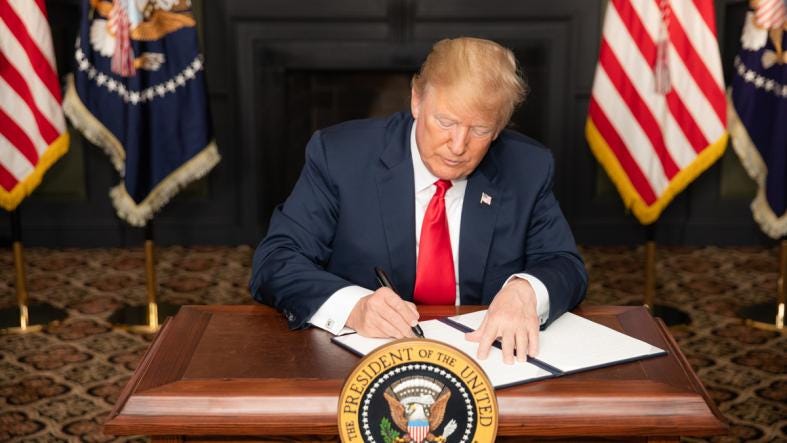
President Donald J. Trump signs an Executive Order in Bedminster, New Jersey, entitled “Reimposing Certain Sanctions with Respect to Iran.” (Official White House Photo by Shealah Craighead)
Do the Iranians want to break the deal? Probably not. A spokesman of the Iranian foreign ministry declared that the Iranian steps are reversible, clearly indicating that Iran prefers to keep the nuclear deal if other countries do their part of the agreement. The actual breach is very limited, does not teach the Iranians anything new for their nuclear programme and does not bring it significantly closer to building an atomic bomb. However, further breaches could shorten to lead time to complete a nuclear programme.
What do the Europeans want? They try to keep the deal alive and are still searching for a mechanism that could allow trade with Iran. However, this seems nearly impossible given Washington’s encompassing financial sanctions. However, they will launch a credit line to facilitate trade with Iran. Whether this will convince firms to get involved in Iran and face the wrath of the US, is very uncertain.
President Trump the peacenik? At the last month, President Trump cancelled a military strike on Iran he had ordered in retaliation of Iran shooting down a drone and instead opted for cyber attacks on Iran. While the US also put sanctions on Iranian Supreme Leader Ali Khamenei and other officials, the Trump administration signalled that it would like to get back to the negotiating table with Iran. It also seems as if Trump’s getting enough of his hawkish advisers (Secretary of State, Mike Pompeo and National Security Advisor John Bolton). Especially seems to be fallen out of grace when he missed Trump’s historical steps into North Korea while he was on a ‘mission’ to Mongolia.
Try the Kim way? Maybe Iran could take some lessons from the North Korean Leader Kim Jong-Un, who seems to be playing the US President just perfectly by providing him with ‘historic’ photo-ops without giving anything substantively. Maybe a visit by Trump (accompanied by Ivanka?) would do a lot to weaken the President’s stance on the Islamic Republic. One problem is that Iranian Supreme Leader Ali Khamenei seems a little bit less well cast to play the role of Jolly Good Fellow that his fellow Supreme Leader Kim Jong-Un seems to love.
5. More trade news
Business risk: Not only the US and China are stirring trade conflict, things also start simmering between India and the US and Japan and South Korea. Especially this last conflict could have an impact on global tech supply chains.
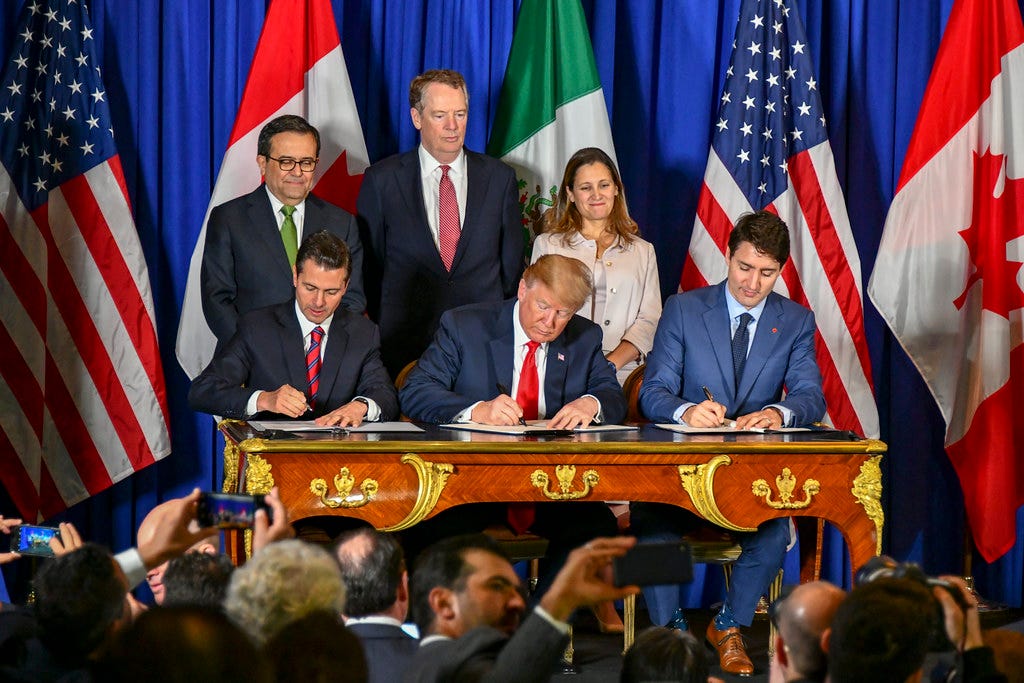
USMCA Signing Ceremony ([State Department photo by Ron Przysucha )
The Good News:
India has increased his tariffs on two dozen US products in reaction to Washington’s suspension of its General System of Preferences (GSP) to India.
Japan has imposed trade restrictions on South Korea for smartphone and chip materials. Japanese firms will have to obtain approval to sell materials used to make chips and smartphones -- to South Korean companies. This is a reaction to a historic dispute between the two countries over wartime labour during the Japanese occupation in World War II.
The Good News:
Mexico has ratified NAFTA’s successor treaty (the USMCA).
The EU and Mercosur (the trading bloc including Brazil, Argentina, Uruguay and Paraguay reached a comprehensive trade agreement after 20 years of negotiation. The deal eliminates 93% of the tariffs on Mercosur's exports and 91% of tariffs on EU exports.


